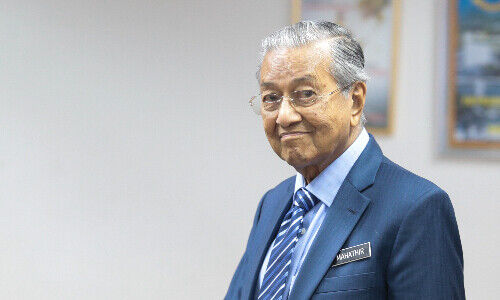Mahathir Mohamad Turns 100: Lee Kuan Yew's Formidable Rival
On this day, Tun Dr. Mahathir Mohamad celebrates an extraordinary milestone: his 100th birthday. For Southeast Asia, he stands as one of the region’s most influential and controversial leaders. For Malaysians, he is the doctor who became a moderniser. For Singaporeans, he was Lee Kuan Yew’s fiercest counterpart.
Born on 10 July 1925 in Alor Setar, Kedah, Mahathir Mohamad’s century-long journey mirrors the story of Malaysia itself – full of ambition, transformation, and the enduring struggle for national identity.
Mahathir’s origins were modest. His father was a schoolmaster, his mother from a humble family. Unlike many regional leaders of his era, he did not hail from aristocracy or elite networks.
Treating Patients Regardless of Ability to Pay
He pursued medicine at King Edward VII College of Medicine in Singapore, qualifying in 1953. Returning to Kedah, he served as the state's first Malay physician, often treating patients regardless of their ability to pay.
This early medical career instilled in him a practical, solutions-oriented mindset. But his aspirations extended far beyond the clinic.
The First Premiership: Architect of Modern Malaysia (1981-2003)
Rising within UMNO, Malaysia’s dominant party, Mahathir became prime minister in 1981. Over 22 years, he reshaped the nation with an iron will and a futurist’s eye. He introduced the «Malaysia Incorporated» model and accelerated privatisation.
During the Asian Financial Crisis, he famously defied the International Monetary Fund (IMF), imposing capital controls and stabilising the economy on Malaysia’s own terms.
«Father of Modernisation»
Under his leadership, Malaysia saw a burst of national pride in the form of ambitious megaprojects: the Proton car, Petronas Towers, Putrajaya, and Cyberjaya, symbols of a nation staking its place in the 21st century. He also signed the Hat Yai Agreement, ending a long-standing Communist insurgency.
By 2003, he stepped down as Malaysia’s longest-serving leader, hailed as the «Father of Modernisation» – and not without controversy.
Rivalry for the Ages: Mahathir vs. Lee Kuan Yew
If Southeast Asia had a Winston Churchill vs. Charles de Gaulle, it was Mahathir vs. Lee Kuan Yew. Both men were titanic figures in their countries. Both shaped their nations after the trauma of colonialism. And both took very different paths.
While Lee pursued a tightly regulated, city-state model built on meritocracy and the rule of law, Mahathir championed affirmative action, Malay nationalism, and state-led development. Their opposing visions often clashed, especially on issues like water rights, bridge diplomacy, and Malaysia’s race-based policies.
Deeply Respected
Lee once remarked, «We are multiracial, but not multi-national.» Mahathir, by contrast, believed that Malaysia’s stability required empowering the majority Malay population. To many observers, their rivalry was both personal and philosophical – a struggle between two visions of how Southeast Asia could succeed.
Yet despite their differences, both men were deeply respected for their intellect, stamina, and relentless drive. Their decades-long exchanges helped define the post-colonial identity of the region.
The Comeback: Second Term at Age 92 (2018-2020)
In 2018, Mahathir returned from retirement to lead the opposition in a stunning electoral upset, defeating the government of his former protégé, Najib Razak.
At age 92, he became the world’s oldest head of government, citing his return as a mission to restore accountability following the 1MDB scandal. His second term was shorter and marked by political instability, but it reaffirmed Mahathir’s unique role as a moral authority, even in old age.
At 100: The Mind Remains Sharp
Now a centenarian, Mahathir remains a prolific writer, commentator, and observer of global affairs. His longevity is credited to daily intellectual activity, physical discipline, and an undiminished curiosity.
He continues to issue opinions on topics from Palestine to China’s Belt and Road, often courting controversy but rarely irrelevance.
A Life Beyond Politics
Married to Tun Dr. Siti Hasmah Mohamad Ali since 1956, he is a devoted family man and father of seven (four biological, three adopted). He is also an accomplished author. His books include «The Malay Dilemma», «The Asia That Can Say No», and «A Doctor in the House».
His restored birthplace in Alor Setar has become a public museum, offering a window into his early life.
Legacy of a Century
Mahathir’s centenary invites reflection: a man who outlasted rivals, reinvented himself more than once, and shaped a nation’s destiny. For many Malaysians, he is a symbol of independence, resilience, and ambition. For others, his policies and persona remain complex and divisive.
But even his critics must concede: few leaders have left such an indelible mark, not only on their country, but on an entire region.
In Tension Progress is Born
As the world salutes Tun Dr. Mahathir Mohamad at 100, his long rivalry with Lee Kuan Yew serves as a reminder of how nations are often defined not just by their visionaries but by the tension between them. And in that tension, progress is born.
May his story continue to inspire those who believe that leadership, conviction, and national purpose know no age limit.





















